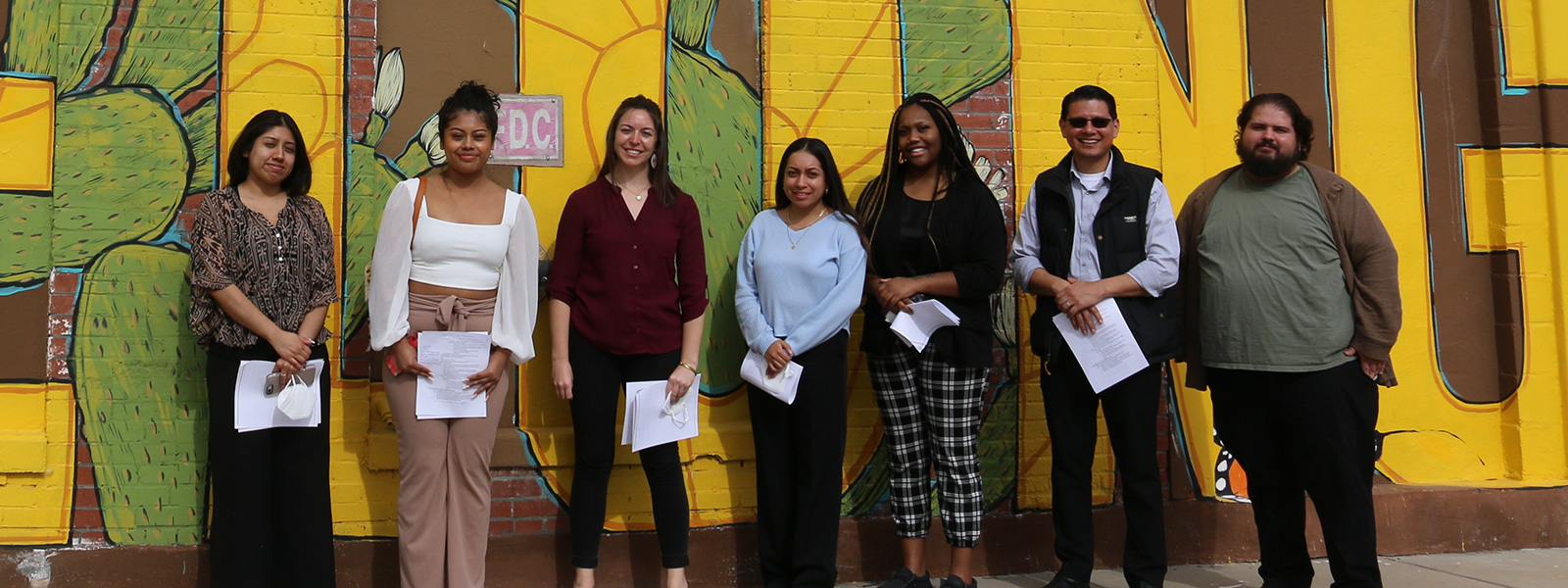
(l. to r. Lucero Torres Manzanares ’23; Diana Florencio Martinez ’23; Laura Hermanns, Campus Minister; Paola Hernandez ’23; Rachel Marie Rogers; Dr. Milton Bravo, V.P. for Mission, Values, and Inclusion; Patrick Giuliani, Hope Border Institute. The team is standing at the Diocesan Migrant & Refugee Services’ “You Belong” mural. Its modern- day message is one of unconditional love and unity.)
Madison, Wis. (May 24, 2023) – While some of their peers flocked to white, sandy beaches during spring break, four Edgewood University students took part in a border immersion experience that would radically challenge, and change, their definition of justice. Organized by the Division of Mission, Values, and Inclusion and made possible by a generous donation from the Strizek family, the group traveled to El Paso, Texas for this experiential learning trip. Vice President for Mission, Values, and Inclusion, Dr. Milton Bravo lead the team while collaborating with the Hope Border Institute, located in El Paso. Their mission is to “bring the perspective of Catholic social teaching to bear on the realities unique to our US-Mexico border region. Through a robust program of research and policy work, leadership development and action, we work to build justice and deepen solidarity across the borderlands.”
Each student selected for the week-long trip represented a variety of disciplinary backgrounds including political science, social work, psychology, and environmental studies. Through times of reflection, the students were able to make direct connections between their experiences at the border, their education, and their future vocations. It was an experience that ministered to students, providing a more nuanced view of the values of truth, compassion, justice, partnership, and community, while better understanding the experiences of migrants and asylum seekers living in Madison.
While immigration is front and center in the news and political sphere, the public conversation often misses out on the reality of what immigration looks like on the ground and the real human stories living this reality. Reflecting on her own life experience of growing up with undocumented parents, Lucero Torres Manzanares shared, “I saw my parents learn the language and culture while working hard to give me a better life than they had. As I am starting my career in social work, I will carry this border experience with me, along with my parents’ story and continue advocating for the rights and respect of immigrants.”
Campus Minister Laura Hermanns also joined the team. She found the prayer vigil at the border wall to be an intense and moving experience. “We spent time reflecting on what we learned about justice and where we saw love at work in the community,” Hermanns said. “We prayed for those making the dangerous journey toward a better life, those who step up to fill in the gaps of a complex immigration system by providing shelter, food, healthcare, and support, and those who make policies that are affecting real people.”
During this educational journey, students were able to witness, experience, and learn more about the complexities and resiliency of life at the US-Mexico border. With the help of the Hope Border Institute, the group spent time listening, learning, and building relationships with indigenous historians, community health workers, agriculturalists, community organizers, Border Patrol, attorneys, migrant families, and faith leaders. Diana Florencio Martinez ’23 found justice comes in many different forms and although we often associate social justice with a rally to protest an issue, it’s often in the subtle acts of service such as prepping meals or celebrating the birthday of a young migrant girl with a special cupcake. In reflecting on what is justice? Martinez writes, “It’s having dignity for others who are in a state of vulnerability; recognizing the predominant yet overlooked issues regarding migrants being treated unfairly and taken advantage of. Justice is evidence of hope – and in order to achieve this we must bring awareness in our own communities of the many injustices present and come together to seek it.”
Guided by the Sinsinawa Dominican heritage, Dr. Bravo and his team continue to advocate for opportunities that integrate and engage the mission values beyond the traditional classroom setting. Planting seeds of community, partnership, truth, justice, and compassion; the hope is students will be inspired to continue telling the stories that shape their experiences.